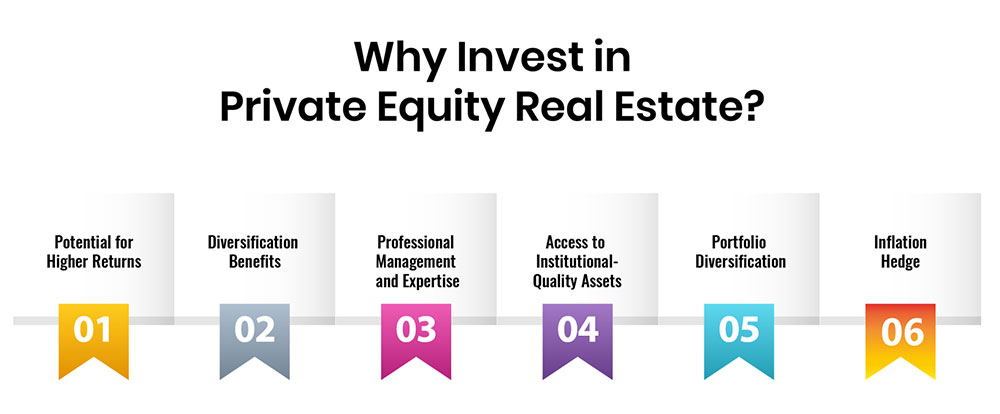Introduction
Private equity real estate offers a wide choice for diversification and the possibility of a higher return as compared to traditional real estate investments. Helping investors develop the right strategies for operating in this global and profitable economy is the key to yielding the best investment benefits.
In this comprehensive guide, we will venture into the world of private equity real estate funds and disclose the details of this investment strategy for those considering taking advantage of it. Whether you are an experienced investor or just getting started, this guide will give you the knowledge you need to make the right decisions and succeed in private equity real estate.
Why Invest in Private Equity Real Estate?
Investing in private equity real estate offers several compelling reasons for investors looking to diversify their portfolios and potentially achieve higher returns:

-
Potential for Higher Returns: Private equity real estate investments have long been known for their high returns; they are even outperforming traditional stock and bond investments in most instances. These investments are the results of implemented active management and value-added strategies by fund managers.
-
Diversification Benefits: Real estate investments from private equity bring an element termed diversification, which means an investment in a separate class that has the potential for low correlation with stocks and bonds. This can be used to mitigate overall portfolio risk and enhance long-term returns.
-
Professional Management and Expertise: These funds are mainly operated by proficient people who possess a vast knowledge of the real estate sector. This can be achieved through professionals' specialization and realization of profitable investment options for people resulting in favorable returns.
-
Access to Institutional-Quality Assets: The private equity real estate funds generally invest in high-quality, institutional-grade properties unavailable to individual investors. It affords investors the avenue to invest in quality real estate assets that make income possible or offer capital gain as the market can determine.
-
Portfolio Diversification: Private equity real estate is one investment vehicle that serves to diversify an investment portfolio if it doesn’t focus solely on stocks and bonds. Property has been traditionally a low correlation asset class which can help to minimize overall portfolio management risk.
-
Inflation Hedge: The sector of real estate is often viewed as a guard against uncertainty because the values of properties and rental income also increase in line with inflation. It can also reduce the risks of your money-losing purchasing power over some time.
Steps to Invest in Private Equity Real Estate
As it relates to investing in the private equity real estate sector, a structured process is followed to make a prudent decision and achieve the best possible outcomes. Here's a detailed look at the typical investment process:
-
Research and Due Diligence: Start by conducting deep research on the available private equity real estate funds and then determine an investment strategy, performance history & control of fund managers. You should also take into account issues such as whether the fund favors developed or developing markets, the property types it operates in, and its risk management plan.
-
Finding Reputable Funds: The best private equity real estate funds can be found in industry publications, professional networks, and recommendations by financial advisors. Funds that have proven they can give good results and take risks like market slippage seriously are the best funds you should go for.
-
Evaluation of Fund Managers: Getting this aspect right is as important as anything else because fund managers are the ones who make the investment decisions. For that you must make sure to choose managers who have remained resilient during the good and bad times of market fluctuations and have never disappointed their investors.
-
Subscription Process: After choosing a fund, you will have to complete the subscription form. At this stage, there is the paperwork in question and the capital necessary committed to the fund, based on the funding schedule, as provided by the fund Managers.
-
Understanding Investment Strategy: Understand clearly the fund's investment strategy, featuring its target markets, property types, and investment timeline. Moreover, this will help you match your investment goals with the objectives of the fund.
Important Factors to Consider Before Investing
Investing in private equity real estate involves several key considerations that investors should be aware of:
-
Tax Implications: A real estate investment by a private equity fund may present multiple levels of tax complications. It is important to appreciate the income taxation of capital gains and capital losses from this type of investment. Tax experts can be a source of information in efforts to maximize tax benefits.
-
Liquidity Concerns: Unlike public real estate investment funds with typical long lock-up periods, private equity real estate funds can hinder investors from accessing money as there is no way out of funds within the specified period. Investors must expect this illiquidity and plan their investment situation for a horizon over the long term.
-
Impact of Economic Cycles: Private equity real estate investments are very much influenced by economic cycles and market conditions. Knowing the impact of these factors on the values and collection of rents is key to making wise investment decisions.
-
Professional Advice: Due to the complexity of private equity real estate investing, seeking help from financial advisors, real estate professionals, and legal practitioners can be helpful. They can produce useful information and aid in the complication of this class of investments.
Challenges and Potential Pitfalls
Investing in private equity real estate can present several challenges and pitfalls that investors should be aware of:
-
Illiquidity: Often private equity real estate investments have long holding periods and therefore it becomes challenging to sell assets in the market. Merchants investing their cash must be ready for these funds to be locked in for a few years at least.
-
Market Volatility: Real estate markets are dependent on economic cycles as well as its move up and down. Market fluctuations, particularly in a downward trend, can present a threat to the value of private equity real estate properties, hence exposing investors to possible loss.
-
High Fees and Expenses: Most private equity real estate funds have high management fees as well as performance fees. Such costs may reduce the overall profitability, meaning that investors need to fully comprehend such costs and negotiate for better deals as and when possible.
-
Complexity of Due Diligence: Before assessing the private equity real estate investment, it is essential to have adequate knowledge of the market trends, properties, and fund managers. Due diligence that is not properly done poses a big risk and may lead to bad investment decisions and poor returns.
-
Regulatory Risks: Government rules and regulations and other compliance issues affect private equity real estate investment. Another implication is that investors need to know the existing laws and regulations regarding the type of investment they are thinking about doing and the possible changes that may occur that may lead to lawsuits against the investor or the investment firm.
Conclusion
Private equity real estate investments provide various selective opportunities along with possible high rewards. Nevertheless, it is important to carry out a thorough investigation, choose reliable funds, and comprehend the risks related to it. Investors in private equity real estate funds must not only rely on the expertise of fund managers but also stay informed about market factors like interest rates and GDP. There are positive sides to this option, but we also need to elaborate on the tax implications, liquidity issues, and lock-up periods.Informed decision-making and expert advice can help investors navigate private equity real estate challenges and enhance their investment portfolios.








